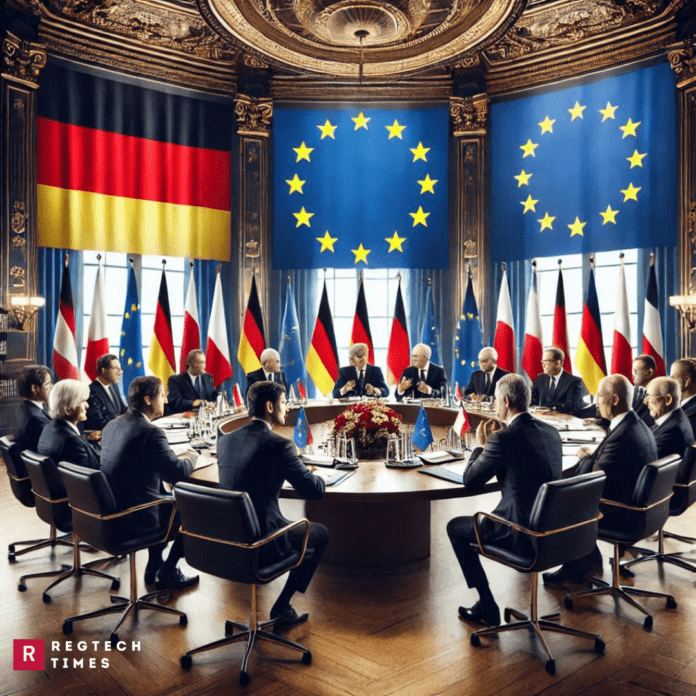Germany, France, and Poland have announced their alignment with the European Union’s decision to revoke the visa-free regime for Georgian diplomats. This significant move comes amidst a deepening political crisis in Georgia and the official suspension of its European integration process, as reported by the Polish Ministry of Foreign Affairs.
European Nations Take a Strong Stand on Georgian Political Crisis
The foreign ministers of the three countries, collectively known as the Weimar Triangle, issued a detailed joint statement expressing grave concerns over Georgia’s current political direction. According to the statement, the crisis originated from decisions made by Georgia’s ruling party, the Georgian Dream, including their move to freeze Georgia’s progress toward EU accession. This, they stated, represents a departure from the European path, which has long been seen as the foundation for Georgia’s future development and international relations.
Repeated calls from European nations urging Georgia to adopt EU norms and values and implement critical reforms have gone unanswered. As a result, Germany, France, and Poland have highlighted the growing strain on relations between Georgia and the European Union.
Violence and Electoral Violations Highlighted by Europe
The situation in Georgia has been further complicated by a series of violent incidents. The ministers strongly condemned the attacks on peaceful protesters, media representatives, and opposition leaders, which have been reported in recent weeks. These acts of violence have alarmed European nations, raising questions about Georgia’s commitment to democratic principles and human rights.
The October 26, 2024, parliamentary elections in Georgia have also been a focal point of criticism. According to a report by the Organization for Security and Co-operation in Europe’s Office for Democratic Institutions and Human Rights (OSCE/ODIHR), the elections were marred by widespread procedural violations. The report described irregularities in voting processes and allegations of voter intimidation, which have undermined public trust in the election results.
In their statement, the foreign ministers of Germany, France, and Poland called on the Georgian authorities to engage in an inclusive national dialogue involving all political parties, civil society groups, and other stakeholders. They emphasized that such dialogue is essential for resolving the ongoing crisis and restoring confidence in the country’s democratic institutions. Furthermore, the ministers urged Georgia to consider holding new elections under fair and transparent conditions to address concerns raised by the OSCE/ODIHR and other international observers.
International Sanctions and Diplomatic Measures Intensify
In response to the crisis, international sanctions have been imposed on key figures in Georgia’s government and ruling party. On December 27, 2024, the United States announced financial sanctions targeting individuals linked to Georgia’s ruling party. These sanctions were imposed due to their alleged role in steering Georgia away from its democratic and Euro-Atlantic future.
Other nations have followed suit. Lithuania recently sanctioned 17 additional Georgian politicians and officials, while Estonia imposed restrictions on the Georgian Prime Minister and 13 other officials. Ukraine also expressed its disapproval of the developments in Georgia, with its president announcing forthcoming sanctions earlier in December.
Germany, France, and Poland have echoed these sentiments, stating that Georgia’s current policies of repression and retreat from democratic norms have not only damaged its relationship with the European Union but also strained bilateral ties with individual member states. The ruling party’s approach has been described as one of increasing isolation from the EU’s democratic framework.
Consequently, the nations of the Weimar Triangle affirmed their intention to follow the EU’s decision to revoke the visa-free policy for Georgians who possess diplomatic and service passports. They have also signaled their intention to consider further measures at both EU and national levels if the situation does not improve. This unified response underscores the seriousness with which European nations view Georgia’s current trajectory.
European Commitment to the Georgian People
Despite the strict measures taken, Germany, France, and Poland emphasized their unwavering support for the Georgian people and their aspirations for democracy and integration with Europe. In their joint statement, the ministers reiterated their belief in Georgia’s potential as a democratic nation aligned with European values.
The ministers also urged the Georgian government to prioritize the interests of its citizens by addressing the root causes of the political crisis and fostering an environment of transparency, inclusivity, and accountability. This, they noted, would not only restore trust among the Georgian population but also rebuild the country’s relationship with the European Union.
The unfolding crisis in Georgia continues to draw international attention. While the EU and its member states remain firm in their criticism of the ruling party’s policies, they have expressed hope that the Georgian people’s aspirations for democracy and European integration will ultimately prevail. The ongoing efforts to resolve this crisis reflect the deep ties between Georgia and Europe, as well as the shared commitment to democratic values and human rights.


